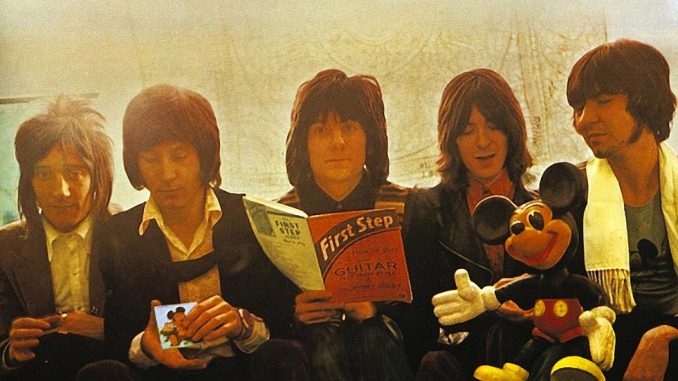
Welcome back to our continuing mini-series, where some of our writers try to justify the Americana tag for an artist not normally associated with the genre. This time around, it’s esteemed features editor, Clint West, who thinks he’s got an obvious candidate for the title – but what do you think?
The Faces were, certainly to these ears, one of the greatest rock bands of the seventies, that decade when rock bands were arguably at their peak and in their pomp. This was a time when such things not only mattered but were the subject of countless sixth-form common room debates. Alas, I wasn’t party to such conversations, having firstly been too young in the early seventies and secondly, even when I was old enough, I never attended such an institution anyway. However, had those two minor details not stood in the way I would have been stood on my soapbox, presumably in some kind of wide-collared paisley shirt and a pair of loon pants extolling the merits of ‘A Nod’s as Good as a Wink…to a Blind Horse’ over ‘Led Zeppelin IV’ or ‘The Yes Album’ which both came out in the same year of 1971.
Via a rather circuitous musical route, not only long and winding, but also too long-winded to recount here, I have ended up at this place we call americana. What that means and how we define it is of course much discussed, but so far, no satisfactory or widely agreed upon definition has been reached. So given that ‘americana’ is a broad and wide-ranging term, I’ve come to the conclusion that my love of The Faces can be explained very simply – they are in fact an americana band. Now pick yourself up off the floor, cease your uncontrollable laughter and hear me out as I put the evidence before you:
If you listen to the music that The Faces made you will find a very large dose of American musical styles and traditions. Often seen as a very English blues-rock band, that description is far too narrow to encapsulate their sound. Yes, there was a hefty dose of blues in there, but not just electric blues. There is a strong thread of acoustic country blues evident too, particularly on the first two albums ‘First Step’ and ‘Long Player’. Then of course there is soul. Had Rod Stewart come to a sticky end around 1975 and therefore not have had the opportunity to completely trash his legacy, it is my contention that he would now be remembered and revered as the greatest blue-eyed soul singer of his time or indeed any time. Ian McLagan’s swirling organ also added to the band’s soul stew. The Faces had a folk side to them too, with instruments like the mandolin and the banjo being utilised on some of their recordings.
For some, americana music is rooted in country music. However, that notion is very restrictive and the fact that there is little evidence of a country influence in the band’s music should not preclude it from being viewed as americana. There are many other American musical forms and as demonstrated The Faces’ music incorporated a range of them. In my introduction, I described The Faces as a “rock band”. This again does not conflict with them being americana too. Most people would include ‘southern rock’ within their definition of americana and The Faces produced music that was often remarkably close to that coming out from Macon, Georgia via Capricorn Records. If someone had put ‘Shake, Shudder, Shiver’ on a southern rock compilation I doubt that anyone would have spotted that it was an imposter.
The Drive-By Truckers are reputed to be big fans of The Faces and it’s not hard to see why. Like The Band, whose self-titled 1969 album was voted the greatest americana album ever by AUK writers, The Faces contained multiple songwriters and although Stewart did the lion’s share of the vocals, others, particularly Ronnie Lane also chipped in. One of Lane’s songs ‘Glad and Sorry’ was covered by Golden Smog also strengthening the americana link. Oh, and the opening song on their debut album is the Bob Dylan song ‘Wicked Messenger’. There you have it then, irreconcilable proof that The Faces were indeed an americana band.



You’ll never convince me that any of these acts are americana (maybe antecedents if you catch me on a good day), but really, who cares? Loving reading the write-ups anyway!
I think the articles are there to promote discussion and understanding as to what ‘americana’ means. Have I convinced myself that The Faces were an americana band? well possibly not if I’m honest, but it has made me think a bit deeper about what that actually means. ‘Americana’ means different things to each of us, There are many ingredients that can go into americana in many different combinations and I think all of the acts featured so far do contain a number of those key ingredients. But I also agree with you main point – just because it has flour in it, that doesn’t mean its a loaf of bread. Glad you’re enjoying the series though.
Using empirical evidence as a way to refine the definition of Americana….more please.
Let’s campaign for The Faces to re-form and play Black Deer
Who cares whether they were ‘Americana’ or not? We should just look on in awe at any band that could produce anything as fine as ‘You Can Make Me Dance …”